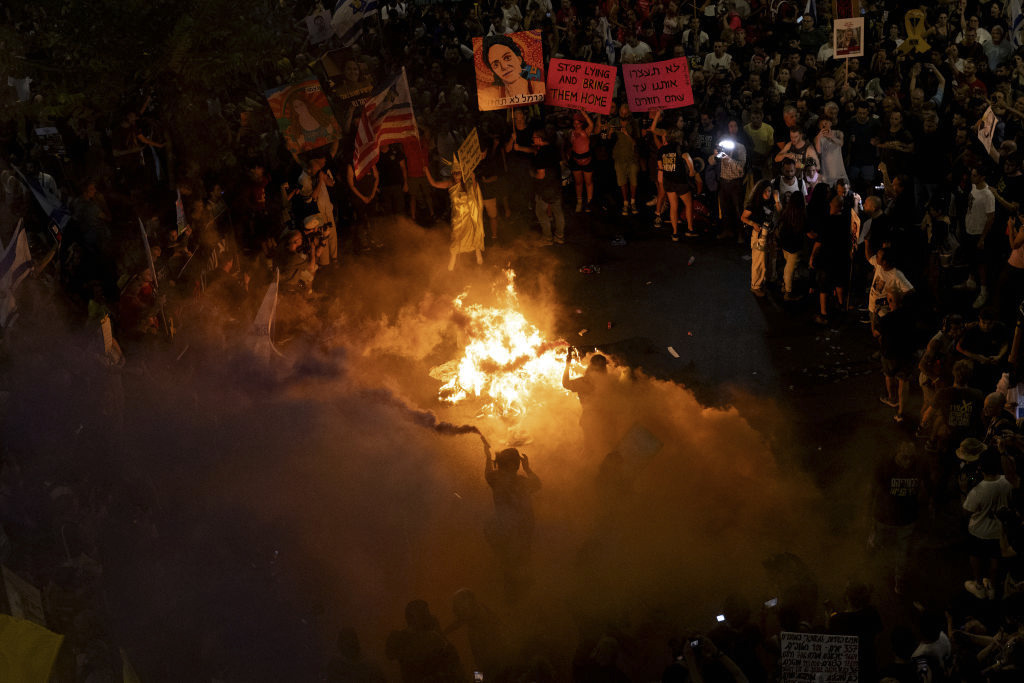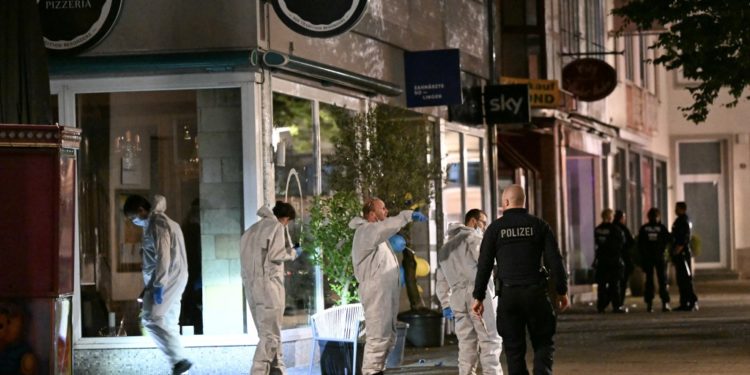 Demonstrantów w Izraelu wspierają różne typy wojskowe i wywiadowcze w zdradzieckiej próbie wyrzucenia Netanjahu z urzędu przez tworzenie podziałów i zniechęcenia, podczas gdy Izrael walczy o życie. Ich głównym twierdzeniem jest to, że Netanjahu przedłuża wojnę i skazuje zakładników na śmierć wyłącznie po to, aby uspokoić ekstremistów w swojej koalicji i w ten sposób utrzymać się u władzy. Na zdjęciu: Antyrządowi protestujący podpalają i używają pochodni dymnych 7 września 2024 r. w Tel Awiwie w Izraelu. (Zdjęcie: Amir Levy/Getty Images)
Demonstrantów w Izraelu wspierają różne typy wojskowe i wywiadowcze w zdradzieckiej próbie wyrzucenia Netanjahu z urzędu przez tworzenie podziałów i zniechęcenia, podczas gdy Izrael walczy o życie. Ich głównym twierdzeniem jest to, że Netanjahu przedłuża wojnę i skazuje zakładników na śmierć wyłącznie po to, aby uspokoić ekstremistów w swojej koalicji i w ten sposób utrzymać się u władzy. Na zdjęciu: Antyrządowi protestujący podpalają i używają pochodni dymnych 7 września 2024 r. w Tel Awiwie w Izraelu. (Zdjęcie: Amir Levy/Getty Images)
 Efekt Oslo: Zakładnicy jako broń do wykonywania brudnej roboty dla Hamasu
Efekt Oslo: Zakładnicy jako broń do wykonywania brudnej roboty dla Hamasu
Melanie Phillips
Tłumaczenie: Małgorzata Koraszewska
Ogromne demonstracje w Izraelu przeciwko premierowi Benjaminowi Netanjahu mogą na ludziach poza granicami kraju robić wrażenie, że społeczeństwo Izraela jest mu ogólnie przeciwne z powodu jego sposobu prowadzenia wojny i że dni jego urzędowania są policzone.
Bardziej prawdopodobne jest to, że izraelska lewica jest w trakcie procesu samozniszczenia raz na zawsze.
Izraelczycy są coraz bardziej oszalali z żalu i przerażenia nad nieludzkim losem zakładników uwięzionych w piekielnych otchłaniach Gazy. Niedawne zamordowanie z zimną krwią sześciu z tych porwanych przez dzicz z Hamasu doprowadziło wielu Izraelczyków do ostateczności.
Żądanie demonstrantów, aby natychmiast zawrzeć zawieszenie broni i uwolnić zakładników, jest nie tylko absurdalne do granic szaleństwa, ale stanowi również bezpośrednie zagrożenie dla bezpieczeństwa Izraela, a nawet jego istnienia — a to jest dokładnie wynik, jaki zamierza osiągnąć Hamas poprzez diaboliczną manipulację losem zakładników.
Demonstrantów w Izraelu wspierają różne typy z armii i wywiadu w zdradzieckiej próbie wyrzucenia Netanjahu z urzędu przez tworzenie podziałów i zniechęcenia, podczas gdy Izrael walczy o przetrwanie. Ich głównym twierdzeniem jest to, że Netanjahu przedłuża wojnę i skazuje zakładników na śmierć wyłącznie po to, aby uspokoić ekstremistów w swojej koalicji i w ten sposób utrzymać się u władzy.
Przeciwnicy Netanjahu nie potrafią zrozumieć, że nawet jeśli premier jest tak oportunistyczny, jak go przedstawiają, jego sposób prowadzenia wojny ma zdecydowane poparcie społeczne.
Większość Izraelczyków chce definitywnego pokonania Hamasu, raz na zawsze. Po atakach terrorystycznych i okrucieństwach z 7 października mieszkańcy południowych społeczności żydowskich domagali się, by Izrael nigdy więcej nie zadowalał się wielokrotnym zadawaniem “poważnych ciosów” Hamasowi, tylko po to, by za kilka miesięcy mógł wznowić swoje mordercze napaści.
Oczywiście, wszyscy rozpaczliwie chcą, aby zakładnicy wrócili do domu. Ale pomysł, że da się to osiągnąć przez zawieszenie broni, jest czystą fantazją.
W pierwszej fazie ma zostać uwolnionych tylko kilku zakładników. Hamas wykorzystałby następnie zawieszenie broni do przegrupowania się i ponownego uzbrojenia, przedłużając farsę negocjacji, aby utrzymać resztę zakładników w pułapce i w ten sposób zachować kontrolę nad Strefą Gazy.
Uwolniliby wszystkich zakładników (jeśli w ogóle) dopiero po całkowitym poddaniu się Izraela. To właśnie promują ci, którzy wzywają do natychmiastowego zawieszenia broni.
Jedynym sposobem na uratowanie zakładników jest presja militarna. To jeden z powodów, dla których Izrael musi koniecznie zachować kontrolę nad korytarzem Filadelfijskim, obszarem Gazy graniczącym z Egiptem.
Nie daje się przecenić znaczenia tego korytarza. Zdobycie go przez Izrael odsłoniło głęboko pod jego powierzchnią rozległą infrastrukturę gigantycznych tuneli do Egiptu — ujawniając w ten sposób główną trasę, którą Hamas importował swoje rakiety, broń i amunicję.
Hamas musi kontrolować korytarz Filadelfijski, aby się zaopatrzyć. Bez tego będzie skończony. Dlatego upiera się, że nie będzie żadnego porozumienia, dopóki Izrael będzie sprawował tam kontrolę.
Ogromna większość wysokich oficerów w armii i funkcjonariuszy służb bezpieczeństwa należących do autorytatywnego Forum Obrony i Bezpieczeństwa Izraela twierdzi nieugięcie, że Izrael nie może oddać kontroli nad korytarzem. Przewodniczący forum, generał brygady Amir Avivi, powiedział w zeszłym tygodniu, że dziesiątki tysięcy rakiet i tysiące terrorystów z odziałów Nukhbah Hamasu czeka na egipskim Synaju, żeby przejść do Gazy przez korytarz Filadelfijski.
Nawet jeśli Izrael wycofa się tylko na krótko, ludzi i sprzęt można sprowadzić w ciągu tygodnia. Egipt zarobił miliardy dolarów na przemycie do Gazy i chce to kontynuować.
Co więcej, powiedział Avivi, tylko 30 z ponad 100 zakładników ma zostać uwolnionych w pierwszej fazie porozumienia, a Hamas podobno planuje przetransportowanie reszty tunelami na Synaj, a następnie do Iranu.
Jednak ten korytarz stał się nagle bronią przeciwko Netanjahu, oskarżanemu o wyolbrzymianie jego znaczenia, żeby zniweczyć porozumienie o zawieszeniu broni i uwolnieniu zakładników.
Podczas kłótni w gabinecie bezpieczeństwa minister obrony Joav Gallant podobno nazwał sprawę korytarza Filadelfijskiego “niepotrzebnym ograniczeniem, które sami nałożyliśmy na siebie”. Gadi Eizenkot, były szef sztabu Sił Obronnych Izraela, powiedział, że korytarz nie ma strategicznego znaczenia. Były minister obrony Benny Gantz powiedział, że Izrael może powrócić do korytarza, jeśli uzna to za konieczne, gdy zakładnicy wrócą do domu.
Wysuwano także argumenty o nakłonieniu Egiptu do ochrony korytarza Filadelfijskiego przed Hamasem i wykorzystaniu czujników elektronicznych do monitorowania tego miejsca.
To wszystko są kompletne urojenia. Przez dwadzieścia lat Egipt był współwinny budowy i użytkowania tuneli pod granicą; powierzenie mu bezpieczeństwa Izraela oznaczałoby powierzenie lisowi kontroli nad kurnikiem. Izraelskie poleganie na czujnikach elektronicznych było jednym z powodów, dla których doszło do pogromu 7 października.
Jeśli chodzi o powrót Sił Obronnych Izraela do korytarza po wycofaniu się, tego samego argumentu użył premier Izraela Ariel Szaron przy wycofaniu się z Gazy w 2005 r., kiedy wycofał Izrael również z granicy między Gazą a Egiptem — kwestia, z powodu której Netanjahu zrezygnował z jego rządu. Podobnie jak międzynarodowa presja sprawiła, że Siły Obronne Izraela nigdy nie wróciły, pomimo późniejszych ataków rakietowych z Gazy, tak przyszły powrót do korytarza Filadelfijskiego po wycofaniu się teraz byłby dla świata całkowicie nie do przyjęcia.
Mimo tysięcy ludzi na ulicach, większość Izraelczyków to rozumie. W jednym z sondaży opinii publicznej 79% zgodziło się, że Izrael musi na stałe kontrolować korytarz Filadelfijski, aby zapobiec przemytowi broni z Egiptu do Gazy. Na bardziej emocjonalne pytanie, czy Izrael powinien kontrolować korytarz Filadelfijski “nawet kosztem umowy o zakładników”, więcej respondentów odpowiedziało, że tak, niż tych, którzy sprzeciwiali się zapobieganiu umowie.
Gantz, Eizenkot i Gallant są częścią establishmentu wojskowego i bezpieczeństwa, którego moralnie i intelektualnie zbankrutowana “koncepcja” była przyczyną katastrofy 7 października.
Również Netanjahu był częścią tego samego establishmentu i w odpowiednim czasie będzie musiał być rozliczony w związku z odpowiedzialnością, jaka na nim ciąży.
Jednak ci, których nie zaślepia patologiczna nienawiść do Netanjahu, widzą, że powstrzymuje on intensywną presję ze strony Ameryki, by armia wycofała się z korytarza Filadelfijskiego, tak jak widzą, że sama Ameryka ponosi znaczną część odpowiedzialności za los zakładników.
Administracja Bidena zmusiła Izrael do działań w Gazie znacznie powolniejszych, niż IDF uważało za konieczne, by pokonać Hamas i w ten sposób uratować zakładników. Co gorsza, przez trzy miesiące administracja nie pozwalała Izraelowi wejść do Rafah — pod którym w tunelach zamordowano w tym miesiącu sześciu zakładników. Gdyby Izrael mógł działać we własnym tempie, tych sześciu jeńców i wielu innych prawdopodobnie można było uratować.
Cokolwiek stanie się z Netanjahu, lewica niemal z pewnością odkryje, że po raz drugi popełniła straszny błąd strategiczny.
Pierwszym takim błędem było Porozumienie z Oslo z 1993 r., które przyznało Palestyńczykom władzę polityczną i status (Amerykanie szkolili nawet ich siły bezpieczeństwa), zakładając, że zamierzają żyć w pokoju u boku Izraela.
Było to zwycięstwo ułudy nad rzeczywistością. Ostatecznym rezultatem było ponad 1000 zamordowanych Izraelczyków w pięcioletniej intifadzie od 2000 do 2005 r. oraz trwała kultura indoktrynacji i podżegania, która dziś zamieniła Judeę i Samarię w kolejny front ludobójczych planów Iranu.
Katastrofalna “koncepcja” Oslo spowodowała, że izraelskie elity zignorowały wyraźne dowody islamskiej świętej wojny prowadzonej przez Palestyńczyków i uwierzyły, że Izrael może utrzymać w ryzach potencjalne “niepokoje”. Wierzyli, że ich wrogiem nie jest ludobójczy palestynizm. Ich wrogiem był Netanjahu.
Dlatego też spędzili większość zeszłego roku walcząc z reformą sądownictwa. A teraz ci sami ludzie w odrażający sposób używają zakładników jako broni w tym samym celu — odsunięcia Netanjahu od władzy. Nie trzeba być fanem Netanjahu, aby czuć złość, przerażenie i wściekłość.
Koszmar Oslo zniszczył szanse izraelskiej lewicy na zdobycie władzy politycznej. Obrzydzenie i gniew opinii publicznej, że ci sami ludzie wykonują pracę dla Hamasu, promując kapitulację Izraela, oznacza, że ta straszna zdrada nie zostanie zapomniana ani wybaczona. Będzie to efekt Oslo na sterydach.
Melanie Phillips jest znaną brytyjską publicystką.
Zawartość publikowanych artykułów i materiałów nie reprezentuje poglądów ani opinii Reunion’68,
ani też webmastera Blogu Reunion’68, chyba ze jest to wyraźnie zaznaczone.
Twoje uwagi, linki, własne artykuły lub wiadomości prześlij na adres:
webmaster@reunion68.com








